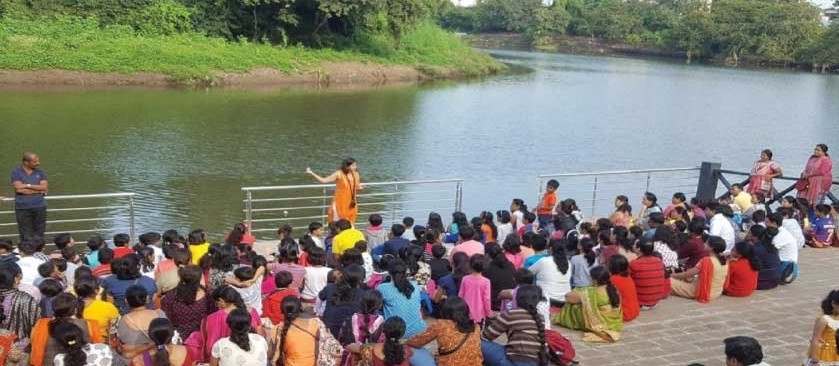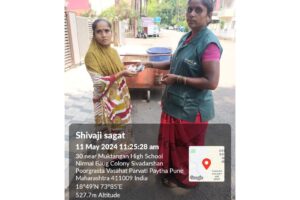Jeevitnadi: A Father’s Promise Sparks A Movement For Revival of Pune Rivers. Read More Here.

Jeevitnadi: A Father's Promise Sparks A Movement For Revival of Pune Rivers. Read More Here.
Pune, once renowned for its pristine rivers teeming with diverse flora and fauna, has witnessed a steady decline in their health over the past few decades.
29 April 2024
By Ishika Kumar
In the heart of Pune, a city bustling with life, lies a silent witness to neglect and degradation—the Mula-Mutha River. Once a thriving ecosystem teeming with diverse flora and fauna, it now bears the burden of urbanisation, choked by sewage and pollution. However, amidst the gloom, a glimmer of hope emerged from an unexpected source—a father’s promise.
In 2014, Niranjan Upasani made a decision that would alter the course of his life and inspire a movement. Instead of celebrating his son’s first birthday with the usual pomp and splendour, he chose a different path. Together, they stood by the murky waters of the Mula-Mutha River, polluted and forsaken. It was here that Upasani made a solemn vow to his child. He promised that by his tenth birthday, the river would be clean enough for him to play in.
This simple yet profound pledge marked the birth of Jeevitnadi; an environmental conservation organisation dedicated to the revival of Pune’s rivers. Upasani’s goal was not merely to fulfil a personal promise, but to ignite a people’s movement for environmental conservation. He envisioned a future where citizens took charge of such larger-than-life initiatives, irrespective of governmental apathy or bureaucratic hurdles.
Pune, once renowned for its pristine rivers teeming with diverse flora and fauna, has witnessed a steady decline in their health over the past few decades. Birds like the pied kingfisher, lapwing and pheasant-tailed jacana once graced the riverbanks, accompanied by a rich variety of fish and lush vegetation. However, the rapid urbanisation of the city since the 1990s has taken its toll, transforming these once majestic water bodies into little more than polluted drainage canals.
“It is going to take 50 to 60 years because the current condition of the river has taken 50-60 years to create,” Upasani reflects somberly. His words carry the weight of reality, stressing the magnitude of the challenge faced by environmental activists like himself.
The journey was tough and fraught with challenges and setbacks. The members of Jeevitnadi, with no prior expertise in environmental science, embarked on a daunting mission. Meanwhile, builders continued to dump construction waste, households discharged sewage and shops polluted the waters with impunity. The task had begun, but it seemed impossible in the beginning until they realised the power of collective action.
Led by individuals like Shailaja Deshpande, Jeevitnadi began to carve a path towards change. They engaged with the community, raised awareness and initiated practical solutions.
One such initiative was the restoration of the Mula-Ram Confluence—a sanctuary amidst the urban chaos. Through dialogue with the Pune Municipal Corporation (PMC), they implemented measures to prevent further degradation, symbolising a triumph of grassroots activism. The methodology employed by Jeevitnadi in their quest to revive Pune’s rivers is as diverse as it is innovative, nestled within a forest along a bustling road in Baner. Here, Jeevitnadi’s intervention has been instrumental in implementing practical solutions to combat pollution and degradation.
However, their efforts extended beyond physical interventions. Jeevitnadi understood the importance of storytelling in mobilising support. Through curated walks along the riverbanks, they brought to life the rich tapestry of mythology, history and science intertwined with these water bodies. Participants not only gained knowledge but also felt a sense of ownership and responsibility towards their environment.
Beyond tangible interventions, Jeevitnadi has leveraged storytelling as a powerful tool for advocacy and awareness-raising. By weaving narratives that educate people about the rights of both people and rivers, they have succeeded in mobilising support and expanding their network. The recent landmark judgement by the Supreme Court recognizing the right to be free from the adverse effects of the climate crisis further validates Jeevitnadi’s longstanding advocacy efforts.
The path was laden with obstacles, from entrenched cultural practices to religious beliefs. Farmers struggled with contaminated water sources, while devotees continued to pollute the rivers with offerings wrapped in plastic. Yet, Jeevitnadi persisted, confronting these challenges head-on with unwavering determination. Their resilience bore fruit as others joined their cause.
Organisations like the Inner Wheel Club of Pune and individuals like Shrunali Apte embraced their mission. Inspired by Deshpande’s vision of sustainable living, Apte made a conscious choice to eschew chemical-laden products, returning to traditional, eco-friendly alternatives. Apte’s journey epitomises the ethos of Jeevitnadi—a commitment to reclaiming our rivers, one step at a time. It’s a testament to the power of individual action and collective endeavour in the face of environmental degradation. As Upasani once remarked, the road ahead may be long, spanning decades, but it is a journey worth undertaking. In a world besieged by ecological crises, Jeevitnadi stands as a beacon of hope—a reminder that against all odds, rivers can be revived, and promises can be fulfilled.
It is a call to arms for every citizen to embrace their role as stewards of the environment, safeguarding not just the rivers of Pune, but the future of generations to come.









